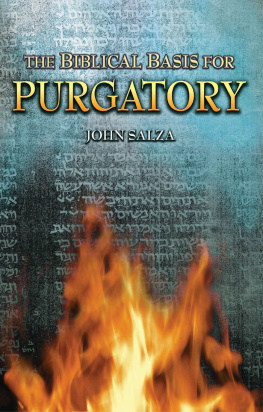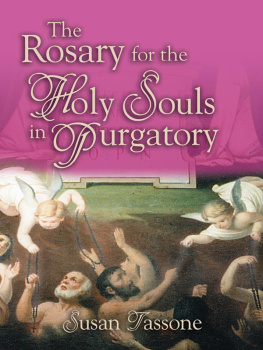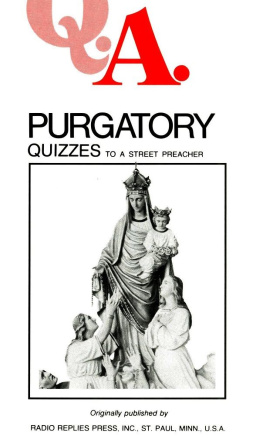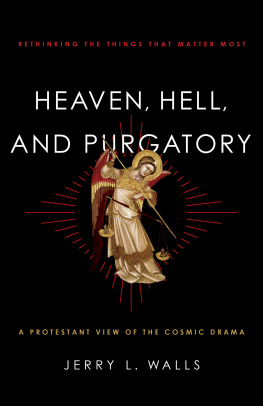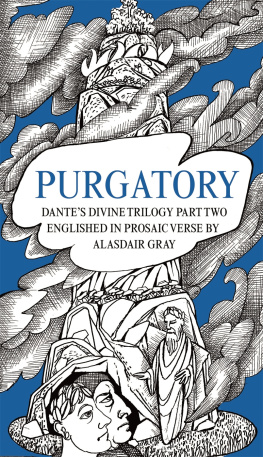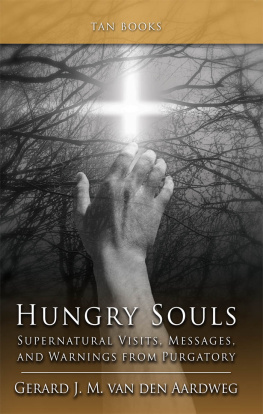VISIONS OF PURGATORY
A PRIVATE REVELATION
ANONYMOUS

The total or partial reproduction of this book is not permitted, nor its informatic treatment, or the transmission of any form or by any means, either electronic, mechanic, photocopy, or other methods without the prior written permission of the publisher.
Originally published as Regard sur le Purgatoire, 1994 by SAINT-PAUL ditions religieuses, 101 rue de Svres, lot 1665, 75272 PARIS, cedex 06.
Scripture texts from the New and Old Testaments are taken from The Holy Bible Revised Standard Catholic Edition 1965 and 1966 by the Division of Christian Education of the National Council of the Churches of Christ in the United States. All rights reserved. All copyrighted material is used by permission of the copyright owner. No part of it may be reproduced without permission in writing from the copyright owner.
English translation copyright 2014 by Scepter Publishers, Inc.
P.O. Box 1391
New Rochelle, NY 10802
www.scepterpublishers.org
All rights reserved.
Text design by Rose Design
Printed in the United States of America
ISBN: 978-1-59417-218-2

| My child, put heaven in your soul, purgatory in your heart, and earth in your hands... That is to say: Heaven should be the object of your contemplation, purgatory should be the privileged object of your prayer, earth should be the place where you sanctify yourself by your works and the accomplishment of your duties of state. |
Contents
M editating on the mystery of purgatory in the light of the teachings of the Church is a source of great spiritual profit for the Christian. This meditation gives us, in effect, a more profound sense of the holiness of God, as well as a high idea of our vocation, which does not support lukewarmness or cowardly compromises with the world. There we learn purity of love and intensify our desire to see God. Finally, this meditation increases our charity by pushing us to work for those whom St. Veronica Giuliani compassionately calls the forgotten souls.
Dont they have a right, in fact, to our particular concern by reason of their poverty and their suffering? Doesnt fraternal charity, which Jesus praised with such insistence in the parable of the Good Samaritan, provide us with a pressing duty of hastening their deliverance by prayer and offerings? St. Thrse of Lisieux was convinced of this; she never missed saying six Our Fathers and six Hail Marys for them every evening. There were many saints throughout the ages who were called to pray especially for the souls in purgatory. The name of St. Catherine of Genoa is noted especially. Her Treatise on Purgatory is the admirable summary of a mystical experience orin some sensea profound knowledge in the depths of her heart of the suffering that the souls endure in that place of purification.
To encourage the faithful to pray for the souls of purgatory, it seems opportune to publish this book whose author, at the request of his spiritual director, wishes to remain anonymous. Certainly, private revelations do not add anything to the unique revelation of Jesus Christ, which is guarded and transmitted faithfully by the Church. Their conformity with the teaching of the magisterium should be verified.
It should also be noted that the ecclesiastical approval itself, where it is granted, does not guarantee the supernatural origin of what is published here. Finally, it is important to emphasize that private revelations are not intended to satisfy a vain curiosity or to decide problems discussed by theologians. That is to say, the reader of this work is free to make his or her own judgment.
For my part, I would like this account, beyond its particular form, to revive devotion to the souls in purgatory and promote beneficial reflections. With St. Catherine of Genoa, it is good to say:
O infinite good, how is it that you are not loved and known more by those who are made to know and rejoice in thee? By the little bit of feeling and of taste that God by his grace gives as proof, man should leave this world, to possess them, leaving every other thing.
SPIRITUAL DIALOGUE, PART III
Henri Brincard
Bishop of Puy in Velay, France
T he reader will be undoubtedly surprised by the clarity and sobriety of this account of purgatory. One of its principal features is emphasizing the luminous aspect of this mystery. And it is particularly fortunate because, as Cardinal Charles Journet says, We can take more consolation than fear from purgatory. Purgatory is a gift of the wounded heart of the Lamb, where Mercy envelops Justice. Its contemplation should be a font of acts of thanksgiving and of praise; we should avoid it, not through servile fear, but to please God, as St. Thrse of Lisieux tells us.
We would like to make a few comments on this narrative:
To offer our readers teachings that will be of profit to all, we have omitted, with the approval of knowledgeable theologians, anything that could distract ones attention from what is essential. We have also removed passages concerning the personal life of the author, who, by the advice of his spiritual director, prefers to remain anonymous.
The text has been written chronologically. In order to facilitate its understanding, it has been divided into three parts. The first part concerns the purpose of private revelations and the way of gaining profit from them. In the second part, the teachings of a more doctrinal character have been systematically arranged to form, in some way, a treatise on purgatory. The third and final part is dedicated to some manifestations of souls in purgatory. This arrangement does not strictly follow the chronological order of the original account, insofar as it has at times been beneficial to bring together passages on some common theme.
Given the profundity of the published text, it has seemed indispensable to add notes to make some passages clearer. These notes are inspired above all by the teachings of St. Thomas Aquinas.
A NOTE CONCERNING PRIVATE REVELATIONS
The Catholic Church considers private revelations possible and even real in some cases (since it has approved some), but relatively rare and necessarily subject to public revelation.
These private revelations do not add anything to the deposit of Faith, which closed with the death of the last apostle. Actually, He who gave us his Son, who is the Word, has no other Word to give us: He has told us everything at the same time, once and for all, in this single Word.
The Church does not approve them until they have been carefully investigated, and it makes sure, above all, of the objectivity of the facts and the usefulness of the messages within general revelation. In fact, even if they are approved, they are not an object of faith. However, these revelations, if they are divine, oblige those to whom they are made and those who are certain of their historical and theological truth (Dictionnaire Apologtique, article cited). On these private revelations prudence is imposed, but not systematic disparagement nor mocking skepticism.
Dictionnaire Apologtique de la Foi, art. Revelation, vol. IV [Paris: G. Beauchesne, 1928], col. 1008).
St. John of the Cross, Subida al Monte Carmelo, II, 20, Obras Espirituales.
See Ren Laurentin, Fonction et statut des apparitions, in Vraies et fausses apparitions dans LEglise (Paris: Lethielleux, 1976), 163.
St. Thomas Aquinas, Summa Theologica IIII, q. 174176.
Next page








